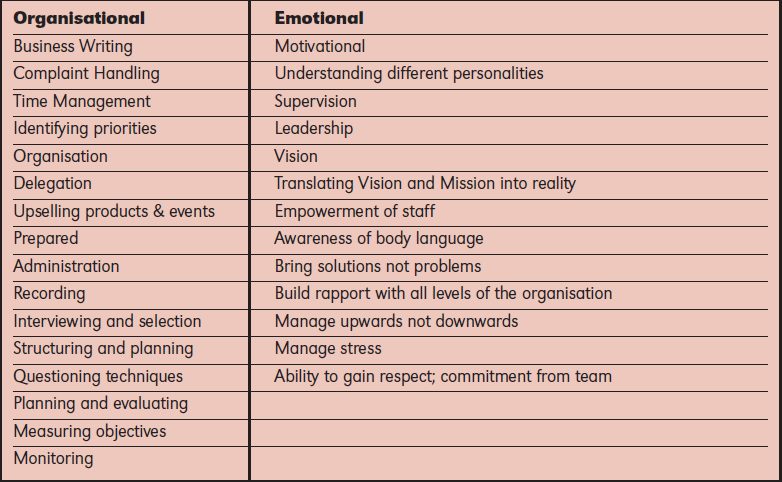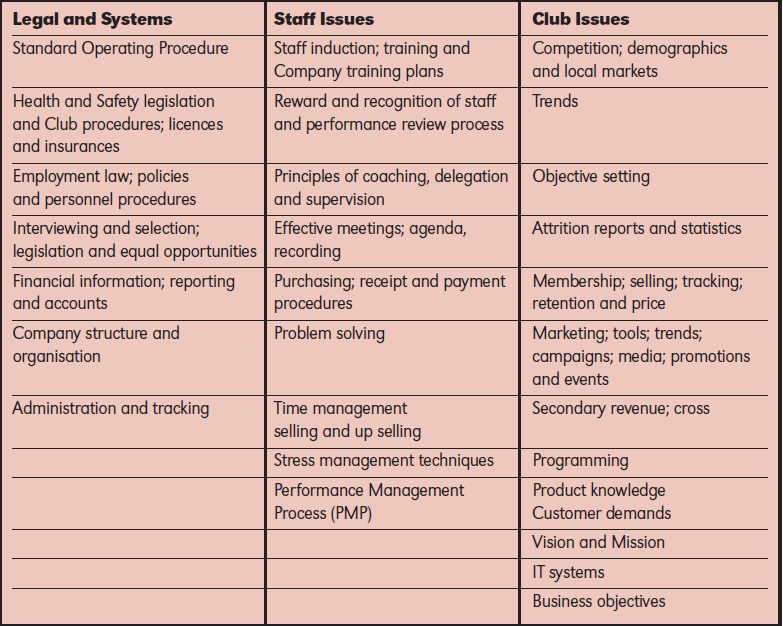What separates a reasonably competent club manager from an inspiring one? And how do inspiring club managers organise their day, week, month and year? Tory Brettell examines the traits of a successful manager and confident leader.
Management processes need to be broken down into four key headlines for the Manager to concentrate on and above all ensure their team understands the demands and targets of the club on a timely basis. These are as follows:
PEOPLE
PROCESS
PRODUCT
PROFIT
Ensuring the team understand these four P’s is an important part of the delivery plan and everyone in the team must embrace them.

PEOPLE
We need PEOPLE to work and operate our Clubs and these people must be “Our type of people”.
We also need PEOPLE to use (and pay) our facilities and enjoy the activities, ambience of the Club and the social aspect. Everyone has their own needs and objectives why they have joined a Club and we have to ensure their expectations are met and if possible exceeded.
PROCESS
All Companies have systems and PROCESSES to ensure all employees know how to conduct their business and Standards of Operation bring confidence to the members as they know what to expect.
Member expectations are high and we must deliver consistent standards at all times. This will encourage and endorse a repeat member and attrition would become low.
To have a reputation and be known is a PROCESS that PEOPLE can relate to and this will bring new members to the business.
PRODUCT
To deliver a PRODUCT to the member it has to be operationally friendly, safe, consistent on standards, organised, hygienic and be equipped with a Health and Fitness activity/function that is going to help the member achieve their personal goals.
PRODUCT can have a USP (Unique Selling Point) and this can be an attractive advantage over the competitor. Be one step ahead and think of one!
The PRODUCT must be maintained and kept up to date. Investment must be ongoing and calculated.
PROFIT
To make a business work and the ultimate is the Club has to make money – PROFIT.
The costs for operating and staffing the Club have to be correct. The PRICE of a membership within your market place must be right. Secondary revenue must be encouraged and percentages (%) of costs to revenue be evaluated on a daily basis.
To have a successful business PROFIT is what the owners and shareholders will want. The staff will deliver the standards, build upon relationships with the members and maintain them within the business.
So if the above is delivered to the owners, shareholders and members, operational excellence looks safe and comfortable. The qualities and attributes of a Club Manager need to be all there to produce the four P’s!
Performance Management Process (PMP)
For a Manager to be an inspiring, confident, dedicated and enthusiastic leader he or she must posses a number of qualities and these are as follows:
- Communicate effectively with members and staff
- Plan, produce and review operations
- Manage exceptional customer service
- Recruit staff
- Retain staff
- Manage staff
- Manage time
- Provide prompt and accurate management information to owners/head office
- Manage programming and retention
- Implement marketing strategies
- Manage the sale process
- Produce/implement strategic plan
- Implement and monitor company procedures
- Train and develop staff
These are known as the Core to an Effective Manager and each of the above are accessed by their Attitude, Skills and Knowledge to deliver to their team, members and colleagues.
Attitude
To have the right ATTITUDE in delivering the core activity is essential to success and to all of the
Performance Management Process (PMP). Relevant words would include manner, opinion, posture, mood, disposition, demeanour, approach, frame of mind and behaviour.
It is all well and good for the Club Manager has the correct ATTITUDE but they need to have the SKILL to implement the activity. SKILL is described as ability, accomplishment, adroitness, aptitude, artistry,capability, cleverness, competence, craft, cunning,dexterity, expertise, facility, flair, gift, knack, mastery, professionalism, technique, versatility, workmanship, prowess talent and proficiency. Have you – or your manager – got these SKILL attributes?

When adapting the SKILL level of a Club Manager and viewing the PMP the following set of SKILLS must be split into two categories,Organisational and Emotional, as the chart above highlights.
KNOWLEDGE
It is great to be able to have a manager who ticks all (or quite a few) of the boxes in ATTITUDE and having the SKILL to deliver, but to have the KNOWLEDGE of the environment and of general management are the final ingredients in this cooking feast. KNOWLEDGE is explained as the data, facts, information, awareness, consciousness, experience, expertise, familiarity, grasp, insight and know how. To relate this KNOWLEDGE to the Health and Fitness sector, the chart below show a list of procedures, but above all it is KNOWLEDGE that must be obtained and learned.

How do effective managers organise their time?
Time management and prioritising the day plus planning ahead are key skills that the highly effective manager will have imprinted into their persona. To be a success you need to be on time with deadlines, be able to forecast ahead and deliver what you say you are going to do within the boundaries agreed with your superiors/line managers. But even more than this, you need to be a good time manager for your own sake.There is nothing worse than recognising too late that you had a meeting five minutes ago or that are port should have been on your boss’s table two hours ago. I’m sure everyone reading this will have examples where something hasn’t been executed within the deadline!I always recommend that managers produce and prioritise a list of tasks at the end of their day. The next day the day’s activities are reviewed (short term), appointment schedules checked and other activities planned for that week, month and year examined.
Things will always change and the unintended things – like a break down on the pool plant – may occur and your plan of action points is shifted to the adverse. Therefore, plan in ‘windows’ of unforeseen circumstances. Don’t give yourself too much to achieve on a daily and weekly basis. Finally remember to make objectives realistic to achieve and constantly review short term and long term activity.
Creating an enthused, focused team
For the manager to gain respect from their team they need to be honest, show the fun element of their personality and involve the team wherever possible in building the club into a place people want to work and people want to go to.
Make the place a fun place to be. Be positive; empower the team and involve them in decision
making. Encourage them to take ownership. Communicate to them verbally on a day-to-day basis (all of them). Hold weekly meetings, use memos and handover dairies.
Establish social events for departments and – when possible and budgets permitting – have team outings to related or unrelated sports activities. Maybe a dinner, bowling, horse racing or a visit to a key event – the list is endless. Some may be at the cost of the club, others may be subsidised and some will be paid for by the employee.
Keep the motivation high using positive body language and speech. Communicate in an enthusiastic manner and the team will work with you and for you.
Management by gender – which is best?
When managing several of the processes above, I believe male and females do differ in their actions and we can learn from our counterparts.
Female management
In interviewing and selection female managers are generally more probing, sensitive and have greater empathy. In all aspects of interviewing, from recruitment to disciplinary actions or meetings with suppliers and members, female managers are usually more conscientious on detail and will record every aspect.
No fact is left un-turned; all is investigated, documented and reported. Attention to detail is one of the key attributes of a female manager. As such, prioritising work for the next day and reaching deadlines is a key component to their make up.
Male management
Male managers tend to join in with the team and be seen as a team member rather than a boss. They can sometimes be too familiar with team members/members and must use judgement in their approach, bearing and body language when enforcing a message.
Male managers are generally very visionary, innovative and love to deliver small projects. Once one is completed, they like to concentrate on another, rather than doing two things at once. They are great at empowering staff and motivating them in and out of work. Conscience of costs they will without hesitation cut where needs be (and maybe without fully investigating the problem) and discipline employees who do not perform.
Male managers can learn from female managers and vice-versa, each having strong areas in their leadership abilities. For every person, regardless of gender, there will be areas to develop, but success depends on their outgoing personality and the skill to have an open mind, take on feedback and to have the ability to change and learn.
Challenge
Now, time to review all the elements under each of the main headers, ATTITUDE, SKILLS and KNOWLEDGE and access where you or your managers are in the scope of this Performance Management Process.
Ask yourself:
1. Does my performance review (appraisal) cover these aspects of my job role?
2. What areas am I good at and which areas do I need to develop?
3. Am I a strong male/female manager and what areas do I need to improve in?
4. What are my communication timekeeping and motivational skills like?
5. Do I embrace my PEOPLE, use their skills and are they our type of PEOPLE?
6. Do I deliver all the company PROCESSES to the standards expected?
7. Is the PRODUCT clean, safe and operationally friendly?
8. Am I producing the correct financial (PROFIT) results in line with the business plan?
9. What have I learnt from this article?
10. Can I change to become a Highly Effective Health Club Manager?
Article published in Clubhouse Europe issue 13

